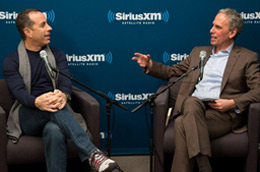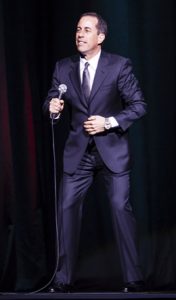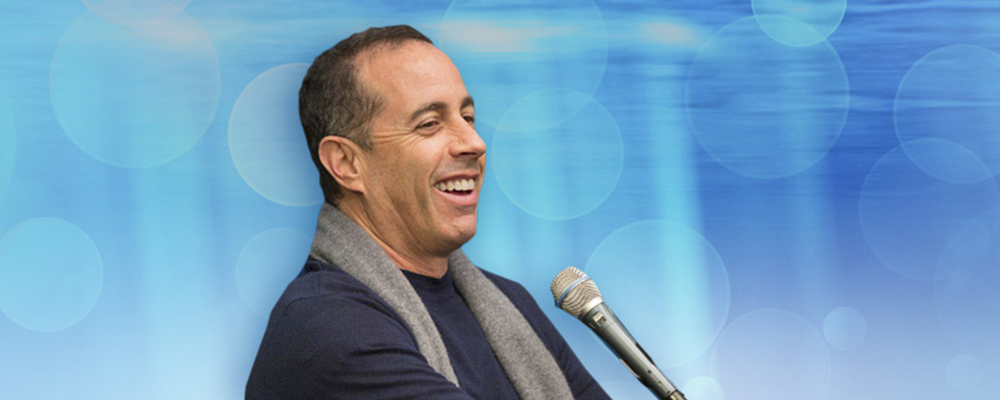Bob Roth: George Stephanopoulos, you, and I were on Good Morning America last year, and you gave a great definition of what [Transcendental] Meditation® is.
Jerry Seinfeld: I said that it’s like you have a cell phone, and then somebody gives you the charger. And you go, “Oh. Now I can get this thing up to a hundred any time I want.”
 Bob Roth: Yeah, the power is fully juiced.
Bob Roth: Yeah, the power is fully juiced.
Jerry Seinfeld: It’s very easy for me to talk about TM. The way I look at life, basically, is: it’s exhausting—being busy is exhausting, doing nothing is exhausting. No matter what you do as a human on earth, it’s exhausting.
And sleep is a nice rest. Most of us don’t get great sleep. Sleep is very hit and miss, and TM is not. So it’s this thing that augments your need for rest. The people that don’t do it, they say, “I can’t believe you stay up all day. You know, ‘cause I can’t do it.”
Bob Roth: Is it only physical, the recharging? Do you notice anything with your mind, more clarity?
Jerry Seinfeld: I’m a big exerciser—I’m a big gym guy. I love to go. Well, I don’t love it, but I just believe in it. I don’t separate the mind and the body. If my body’s tired, my mind’s tired. If my mind’s tired, my body’s tired.
“If I didn’t do TM that morning and I’m working, then by 1:00 p.m. I’m shot, and I think most people are. And now, at one o’clock, I’m feeling good. I just sail through the day, and then I have my second TM at 3:00 p.m. or 4:00 p.m.” —Jerry Seinfeld
Bob Roth: So you meditate now in the morning, and how do you feel before your morning meditation? You had said at first you were wondering why you should meditate in the morning, because . . .
Jerry Seinfeld: Yeah, why would you rest after you just got out of bed? And I said, if you get up out of bed, and you turn around and you look at it, it doesn’t look like what happened in there was very restful. It looks like a war just went on in there.
Sleep researchers do a time lapse of someone in bed. You’ve seen these things. You’re rolling around and punching pillows and pulling covers. And half of the time you get up in the middle of the night. Right? It’s a war. Sleep is a war.
The great thing about TM is that you never have to wonder. Let’s say you’ve got a big day. And the night before you think, “Alright I’m going to get to sleep early, and I don’t want to mess around. I’m not going to watch junk TV. I want to get a good night’s sleep. But you’re still just kind of hoping that you’re going to wake up feeling refreshed.
That’s the big difference between sleep and TM. TM never doesn’t work perfect. So I get up now, and I do TM.
Bob Roth: What’s your schedule like?
Jerry Seinfeld: I’ll get up at 6:00 a.m. My kids get up about 6:45 a.m. And so I do the TM before anybody gets up. And how does it feel? It doesn’t feel like anything. I don’t understand it. But here’s the difference. At 1:00 p.m. that day, my head does not hit the decks like it used to. That’s the difference. If I didn’t do TM that morning and I’m working, then by 1:00 p.m. I’m shot, and I think most people are. And now, at one o’clock, I’m feeling good. I just sail through the day, and then I have my second TM at 3:00 p.m. or 4:00 p.m.
Here’s another good analogy. And if Bob hasn’t already thought of this, I’ll be shocked. You’re on a road trip. And you’ve got to stop for gas. Have you thought of this one?
Bob Roth: No, that’s a good one.
Jerry Seinfeld: Right, you get in the car. You’re driving the car, you don’t just drive for ten hours. You drive three or four hours and then you stop for gas. For the car, for yourself. That little break. And it’s a big thing. That’s what TM does.
“Standup comedy is an extremely exhausting activity. To have that tool of doing TM before you do your set, you’re going to be a different dude up there. You’re in that place in your mind that you want to be.” —Jerry Seinfeld
Bob Roth: Do you find it hard to find the time and place to meditate?
 Jerry Seinfeld: With TM, you’re just going to sit in a chair. How hard is that? To just sit down in a chair. It’s really a nice thing. I would say the closest analogy I could find to this would be if I said to you, “Look, at five o’clock, you’re going to take a warm bath. That’s part of our company rules. Everybody takes a warm bath at five o’clock.”
Jerry Seinfeld: With TM, you’re just going to sit in a chair. How hard is that? To just sit down in a chair. It’s really a nice thing. I would say the closest analogy I could find to this would be if I said to you, “Look, at five o’clock, you’re going to take a warm bath. That’s part of our company rules. Everybody takes a warm bath at five o’clock.”
You might say, “I don’t really feel like doing that. I don’t normally take warm baths.”
“Well, that’s what we do at this company. We take warm baths at 5:00. We’re going to give you your own nice, clean bathroom.”
I guarantee you, by the second day you’re going to go, “Hey, it’s almost five o’clock. Let’s take that warm bath.”
That’s what TM feels like. You’re just going to sit down and slide into that bath. Those 20 minutes are going to go by like that, and you’re going to be a different person when you’re done. You’re just going to be different.
Here are the two greatest times to do TM: before exercise, for you exercisers out there. Insane what it does for your exercise experience. And before standup, if you happen to be a professional standup comic, or an aspiring standup comedian.
Standup comedy is an extremely exhausting physical and mental activity. To have that tool of doing TM before you do your set, you’re going to be a different dude up there. You’re in that place in your mind that you want to be.
TM before Standup Is Gold
In all things, you want to be relaxed, and you want to have energy—especially sports, and especially performing. A great performance from anybody—whether it’s a singer, an actor, a comedian, or anything—it’s got energy, and it’s relaxed.
We don’t want to see somebody stressed. We want to see somebody confident and smooth. And most importantly, that they seem to know what they’re doing. That’s the first thing an audience wants to feel when someone gets up on a stage. “Does this person know what they’re doing? Because if they do, then I can relax.”
And when you’re trying to elicit laughter, the audience has to be relaxed. If they’re worried about you, the laughs are harder to get. So TM before standup is gold. It’s a golden thing to have.
(Edited for brevity and clarity.)
Listen to the complete interview here ►


Comments
You May Also Like
Personal Growth
TM Was the Easiest Thing I Have Ever Done | 5:48
David Lynch Foundation Executive Director, Bob Roth, interviews Cameron Diaz about her personal practice of TM.
My Story
The “Dear Prudence” Story | 2:55
A profile of Prudence Farrow Bruns, the inspiration behind the Beatles song, in celebration of the 50th anniversary of Maharishi's historic TM Teacher Training Course in Rishikesh, India, 1968.
Creativity & the Arts
Choose Love over Fear | 26:09
With true Carrey flair, Jim delivers a funny but inspiring speech to the students, parents, faculty, university administrators, and many others at Maharishi University of Management.